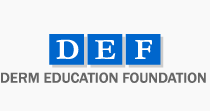|
 |
| DICC
|
A site dedicated to supporting case-based learning by offering an educational interface that uses patient problems as stimulus for learning appropriate dermatology subjects.
|
 |

|
 |
 |
A
case-based learning that uses a patient problem as a stimulus for learning appropriate dermatology subjects. Compared to traditional memory-based or didactic learning, the integrative competency curriculum is thought to be more effective for creating a usable body of knowledge in the mind of the learner. In addition, it allows identification and assessment of competently discussed case objectives categorized into one or more of the ACGME defined competency areas. In the integrated competency curriculum, the problem is encountered first in the learning process and served as a focus or stimulus for learning. The primary educational goals of the dermatology integrative competency curriculum are to acquire an integrative body of knowledge related to the problem and to develop and apply critical thinking, problem solving and self-directed life-long learning skills.
Dermatology residents have learning style preferences consistent with adult learners. Many programs may wonder, “If it isn’t broke, why fix it?” There are two main answers for that question. First, we have to meaningfully incorporate core competencies into our curriculum and, second, our learners are adults, not children. The characteristics of dermatological knowledge is immense and constantly changing. Decision-making, reasoning and problem solving are critical cognitive processes in dermatology practice. Dermatology education extends over the lifetime of the individual, so we need to create a resourceful, efficient, life-long learner. This brings us to the theories of adult learning and brings up a new term to review - andragogy.
Adults have different learning styles than children. Throughout most of primary, secondary and undergraduate education, and even in many medical schools, pedagogical learning styles prevail. The word pedagogy has its roots in the art of teaching children. Andragogy is a term coined by Dr Malcolm Knowles, one of the central figures in US adult education in the second half of the Twentieth Century. Andragogy refers to the art of teaching adults. The reason for the new term was to stress the fact that adults learn differently than children.
There are five main qualities of adult learners. The first is self-direction. Adult learners tend to prefer having a hand in deciding what they need to know. Adult learners are in general experience oriented. Many might consider the entire clinical learning process of dermatology residents to be an excellent example of experience-oriented adult learning. Adult learners are internally motivated. Adults will pursue knowledge for knowledge’s sake, or because of relevance to their chosen area of interest. They do not do it because of a score or a grade. They seek knowledge to improve themselves. Adult learners look for immediate application. Knowledge that has no obvious relevance will often be lost shortly thereafter in the mind of the adult learner. So many facts fill the minds of the adult, but only the most relevant and applicable knowledge will have a tendency for long-lasting resilience. And, finally, adult learners tend to prefer problem-centered learning rather than content-oriented learning. Information concepts and skills are put in the memory in association with a problem, allowing material to be recalled more easily when the adult learner is faced with another related problem. Thus, information obtained in the context of a problem is far better retained than that information passively obtained out of context.
With the ACGME Outcomes Project beginning in 2000, just at the time the curriculum was being developed and piloted, the curriculum project took on new life and new purpose to have at its core a complete integration of all six competencies. No longer would the curriculum focus on patient care and medical knowledge, but now dissecting the learner’s thought processes with the other competencies would occur as well. With each learning session and with each case, faculty, facilitators and dermatology learners would discuss relevant patient-related applicable information and scenarios to further develop the resident’s self-directed competency in a meaningful, applicable, problem-centered fashion. With each case, competently discussed questions and objectives are documented and summarized each in one or more of the six competency areas. Thus, the dermatology integrative competency curriculum serves as a potent format for identifying, teaching and assessing the competencies.
“No One Person Owns a Curriculum”
Success of the dermatology integrative curriculum can only occur with the sharing of the curriculum. This begins at the creator level with an expansion of the key curriculum development faculty. Key dermatologists with various backgrounds and specialty areas of interest have joined the curriculum development faculty. They include experts in general and medical dermatology, pediatric dermatology, dermatology surgery, dermatopathology, basic science, and cosmetic dermatology.
There are many opportunities to participate as a curriculum faculty member. These are the experts currently working to define learning objectives and to develop the problem-centered cases.
“If you have knowledge, let others light their candles with it.”
-Sir Winston Churchill
We are all members of the same residency education community. My hope is that this can be a helpful tool made available to all programs. The intent of this project has always been to share a vision and what I believe to be a better way of learning and a better way of creating a body of knowledge usable in the future in the mind of the learner. For those programs who would like to try this, I would like to offer free access to our online site. User identification and passwords will be given only so that we may help your program keep track of all competently discussed objectives and questions. We will also look forward to your comments, suggestions, and case developments of your own. The feedback from other programs will be very important for us to maximize resident competency.
Visit dermcompetency.com for more information. |
|
 |
|

